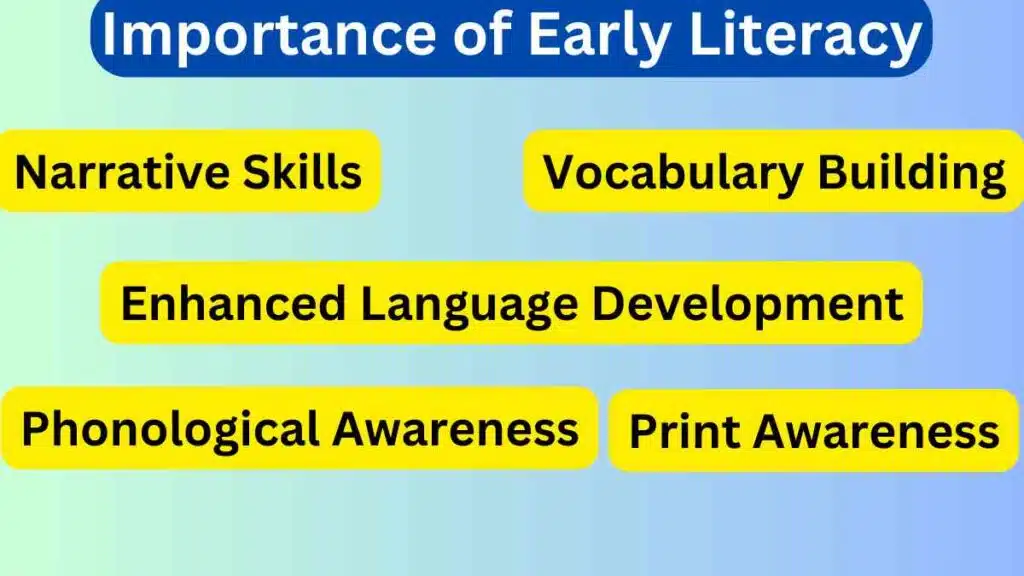Importance of Early Literacy
Early literacy is the foundation for a child’s educational success. By developing language and literacy skills from an early age, children can explore the world, communicate effectively, and excel in school.
Early literacy programs are essential for supporting children’s learning and development, and they should be embraced and supported by communities and educational institutions.
What is Early Literacy?
Early literacy encompasses the fundamental skills required for effective communication, comprehension, and learning. It is not just limited to reading and writing but also includes language development, phonological awareness, print awareness, vocabulary building, and narrative skills.
These skills lay the groundwork for a child’s ability to understand and engage with the world around them, shaping their cognitive and emotional development.
The Importance of Early Literacy
Early literacy is a critical stage in a child’s life as it sets the stage for future academic achievement and lifelong learning. Children who develop strong early literacy skills are better equipped to excel in school, express themselves creatively, and develop a thirst for knowledge.

Moreover, early literacy fosters confidence, imagination, and problem-solving abilities, which are invaluable traits in both personal and professional settings.
The Role of Early Literacy Programs
Early literacy programs play a pivotal role in nurturing a child’s cognitive and linguistic growth. These programs are designed to provide children with a stimulating and supportive environment that encourages their curiosity and eagerness to explore language and literacy. By offering a structured approach to learning, early literacy programs create a solid foundation that paves the way for future educational achievements.
Benefits for Children
1. Enhanced Language Development
Early literacy programs focus on promoting language skills, helping children express themselves fluently and comprehend complex ideas. This leads to improved communication and self-confidence.
2. Phonological Awareness
Phonological awareness involves understanding the sounds of language. Early literacy programs expose children to rhymes, songs, and phonics, which sharpens their ability to recognize and manipulate sounds, a crucial skill for reading and writing.
3. Print Awareness
Developing print awareness allows children to understand that written language carries meaning. Early literacy programs introduce children to books, letters, and words, fostering a love for reading and writing.
4. Vocabulary Building
A rich vocabulary is essential for effective communication. Early literacy programs expose children to diverse words and concepts, expanding their vocabulary and comprehension abilities.
5. Narrative Skills
Narrative skills involve storytelling and understanding the structure of stories. Early literacy programs encourage children to narrate their experiences, which enhances their narrative skills and creative thinking.
Benefits for Parents and Caregivers
Early literacy programs not only benefit children but also empower parents and caregivers. These programs offer valuable guidance and resources, allowing parents to actively engage in their child’s learning journey.
Additionally, parents gain a deeper understanding of their child’s development and are better equipped to support their growth.
Key Components of Effective Early Literacy Programs
To ensure the success of early literacy initiatives, several key components must be incorporated into their design:
1. Collaborating with Schools and Libraries
Effective early literacy programs involve collaboration with schools and libraries to create a seamless transition from early learning to formal education. This partnership facilitates the sharing of resources and expertise, ensuring a holistic approach to a child’s educational journey.
2. Engaging Parents and Caregivers
Involving parents and caregivers in early literacy programs fosters a supportive learning environment. Workshops, seminars, and interactive sessions empower parents to actively participate in their child’s language and literacy development.
3. Providing Accessible Resources
Access to age-appropriate and diverse learning resources is crucial for the success of early literacy programs. Providing books, interactive learning materials, and digital resources ensures that children have ample opportunities to explore and learn.
Strategies for Implementing Early Literacy Programs
1. Engaging in Learning Activities
Introduce engaging and interactive learning activities that capture children’s attention and spark their curiosity. Play-based learning and storytelling sessions can make the learning process enjoyable and effective.
2. Creating Safe and Inclusive Spaces
Ensure that early literacy programs are conducted in safe and inclusive spaces, allowing children from all backgrounds to participate comfortably. Embracing diversity fosters a positive learning environment.
3. Training Educators and Facilitators
Invest in training educators and facilitators to implement the program effectively. Skilled educators can provide personalized support, catering to each child’s unique learning style.
Challenges in Early Literacy Programs
1. Addressing Socioeconomic Disparities
Socioeconomic disparities can hinder access to early literacy programs for underprivileged children. To address this challenge, targeted outreach efforts and community partnerships can bridge the gap and reach marginalized populations.
2. Overcoming Language Barriers
Language barriers can impede a child’s language development and participation in early literacy programs. Implementing bilingual programs and offering language support can help overcome this obstacle.



Leave a Reply